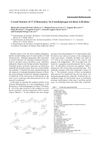 January 2021 in “bioRxiv (Cold Spring Harbor Laboratory)”
January 2021 in “bioRxiv (Cold Spring Harbor Laboratory)” Mothers have more hair proteins than their children, with age-related differences in protein patterns, and some proteins in hair could indicate early childhood development.
 November 2020 in “Journal of Pharmaceutical Sciences”
November 2020 in “Journal of Pharmaceutical Sciences” The decision tree can predict drug absorption issues with good accuracy but needs more validation and adjustments for other factors.
 July 2020 in “bioRxiv (Cold Spring Harbor Laboratory)”
July 2020 in “bioRxiv (Cold Spring Harbor Laboratory)” The structure of SRD5A reveals how it reduces steroids, aiding drug design for related health conditions.
 March 2020 in “The journal of investigative dermatology/Journal of investigative dermatology”
March 2020 in “The journal of investigative dermatology/Journal of investigative dermatology” Suppressing very long chain fatty acids is linked to skin cancer.
 January 2020 in “arXiv (Cornell University)”
January 2020 in “arXiv (Cornell University)” Some existing drugs and natural products might work against COVID-19 by targeting the virus's main protease.

Sinsun-yukza-hwan extract promotes hair growth in mice.
 August 2017 in “Journal of epidemiological research”
August 2017 in “Journal of epidemiological research” Cancer rates are increasing in developed countries, with estrogen, aging, low vitamin D3, and HPV infection as common causes.
 January 2017 in “Korean Journal of Pharmacognosy”
January 2017 in “Korean Journal of Pharmacognosy” Modified red ginseng extract promotes hair growth and has antioxidant and anti-inflammatory effects.
 November 2016 in “Elsevier eBooks”
November 2016 in “Elsevier eBooks” Genetic mutations can affect female sexual development, requiring personalized medical care.

Forensic hair analysis for drugs is now more reliable and accurate.
 April 2016 in “Annals of laboratory medicine”
April 2016 in “Annals of laboratory medicine” The method reliably profiles eicosanoids and shows epitestosterone reduces their levels, similar to common anti-inflammatory drugs.
 August 2015 in “MOJ proteomics & bioinformatics”
August 2015 in “MOJ proteomics & bioinformatics” ePUKs could be valuable for regenerative medicine due to their wound healing abilities.

The research found that people's hair proteins vary, especially by ethnicity and body part, which could help identify individuals in forensic science.

The research found that people's hair proteins vary by individual and body part, with some differences between ethnic groups, which could help in forensics.

Human scalp hair follicles have PGE2 and its receptors, which might affect hair growth.

Accurate diagnosis of cicatricial alopecias requires thorough scalp examination and multiple biopsy techniques.
 June 2010 in “Journal of Chemical Crystallography”
June 2010 in “Journal of Chemical Crystallography” The compound was successfully made and shows potential for treating prostate cancer.
 September 2004 in “Experimental dermatology”
September 2004 in “Experimental dermatology” Melatonin directly affects mouse hair follicles and may influence hair growth.
 January 2004 in “Side effects of drugs annual”
January 2004 in “Side effects of drugs annual” Certain skin drugs and topical agents, including some natural extracts and fragrances, can cause allergic reactions. Some hair dyes and extensions, as well as minoxidil, a hair growth treatment, can also cause allergies. Botulinum toxin A can effectively reduce sweat but may have temporary side effects.
 February 1999 in “Analytical Sciences”
February 1999 in “Analytical Sciences” A new antiandrogen compound was made and its detailed three-dimensional shape was described.
 January 1993 in “Проблемы Эндокринологии”
January 1993 in “Проблемы Эндокринологии” Spironolactone effectively reduces symptoms of hyperandrogenism but has some side effects.
 October 2020 in “Journal of Pharmaceutical Sciences”
October 2020 in “Journal of Pharmaceutical Sciences” Topical finasteride with EGCG or TA improves drug release and dermal uptake, potentially treating hair loss effectively.
 January 2020 in “Química Nova”
January 2020 in “Química Nova” The PW91 method is best for calculating the basic physical and chemical properties of Finasteride, a drug used for prostate issues and hair loss.
 May 2019 in “Asian Journal of Chemistry”
May 2019 in “Asian Journal of Chemistry” Finasteride forms three new products under acidic stress.
2 citations,
June 2003 in “PubMed”  January 2023 in “Brazilian Journal of Pharmaceutical Sciences”
January 2023 in “Brazilian Journal of Pharmaceutical Sciences” A method was found to accurately measure spironolactone and canrenone in blood samples using liquid chromatography-mass spectrometry.
13 citations,
April 2013 in “Chinese Chemical Letters/Chinese chemical letters” The method effectively identifies and measures seven banned substances in cosmetics.
7 citations,
September 1997 in “PubMed”  November 2024 in “Frontiers in Endocrinology”
November 2024 in “Frontiers in Endocrinology” Hair analysis can help diagnose adrenal disorders non-invasively.
 June 2024 in “International Journal of Cosmetic Science”
June 2024 in “International Journal of Cosmetic Science” Plant oils like coconut, camellia, and safflower can penetrate hair, making it stronger and softer.



























